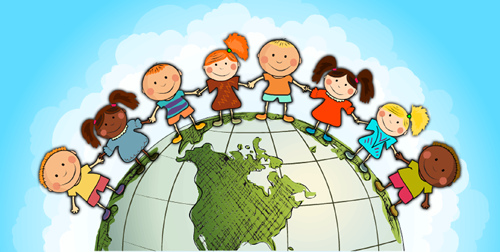Multicultural education is a set of methods and materials in U.S. education that were developed to assist teachers to promote democracy while responding to the many issues created by rapidly changing demographics of their students.
Multicultural education means to assure the highest levels of academic achievement for all students. It helps students develop a positive self-concept by offering knowledge about the histories, cultures, and contributions of diverse groups.
Multicultural education assumes that the future of U.S. society is pluralistic. Today, teachers in most urban areas face students from different social classes and cultural and language groups. Many students do not share the middle-class, European American culture common to most college-educated teachers. Teachers find large numbers of English as a Second Language (ESL) students in their classes in both urban and rural areas such as Iowa and Utah. Multicultural classrooms encourage decision-making and critical thinking while moving away from inequality of opportunity and toward cultural pluralism.
Multicultural educators seek to significantly reform schools to give diverse students an equal chance in school, in the job market, and in contributing to building healthy communities. One of the leaders in the field of multicultural education, recounts five dimensions of multicultural education: (1) content integration, (2) the knowledge construction process, (3) prejudice reduction, (4) an equity pedagogy, and (5) an empowering school culture and social structure.
Many universities provide multicultural education courses and modules as a part of their teacher preparation.
Joe L. Kincheloe and Shirley R. Steinberg, Peter McLaren, Henry Giroux, Antonia Darder, Christine Sleeter, Ernest Morrell, Sonia Nieto, Rochelle Brock, Cherry A. McGee Banks, James A. Banks, Nelson Rodriguez, Leila Villaverde and many other scholars of critical pedagogy have offered an emancipatory perspective on multicultural education.
This theory focuses on the need of including notions of race, class, and diversity while teaching. Multiculturalism supports the idea that students and their backgrounds and experiences should be the center of their education and that learning should occur in a familiar context that attends to multiple ways of thinking. If done correctly, students will develop a positive perception of themselves by indicating knowledge about the culture, history, and contributions of diverse groups. This way, multiculturalism is a tool for instilling students with pride and confidence in their unique and special backgrounds.
Globalization is a social trend which integrates people with different cultural backgrounds. Culture meet, clash, and grapple with each other as if in the contact zone. Under this circumstance, people started to enhance the teaching methods, which means the phenomenon of multicultural education is coming along with the development of globalization. The influence of multicultural education for international students shows on both positive and negative sides. Multicultural education offers a relatively fairer learning environment for international students, which can help them easier to get involved in a new community. Additionally, with the help of this education method, international students can receive more opportunities to better access to knowledge. Moreover, when teachers pay attention to improve a multicultural atmosphere, it helps international students to gradually obtain global view. However, multicultural education may cause abandonment of original cultural for international students. Teachers sometimes use multiple examples to satisfy diverse students, but there is no standard benchmark for multicultural education and teachers usually add their own values to their education. Consequently, if teachers try to deliberately focus on providing multicultural examples, it may confuse international students and it cannot guarantee a fair education environment. Furthermore, international students may feel being left out when teachers want to put more importance on multiculturalism. Overall, multicultural education is a dialectical issue with two sides.

